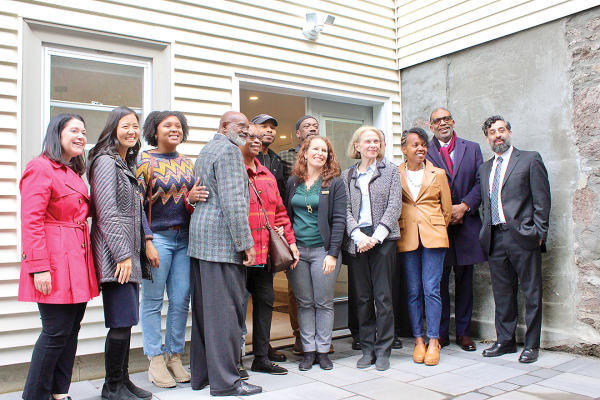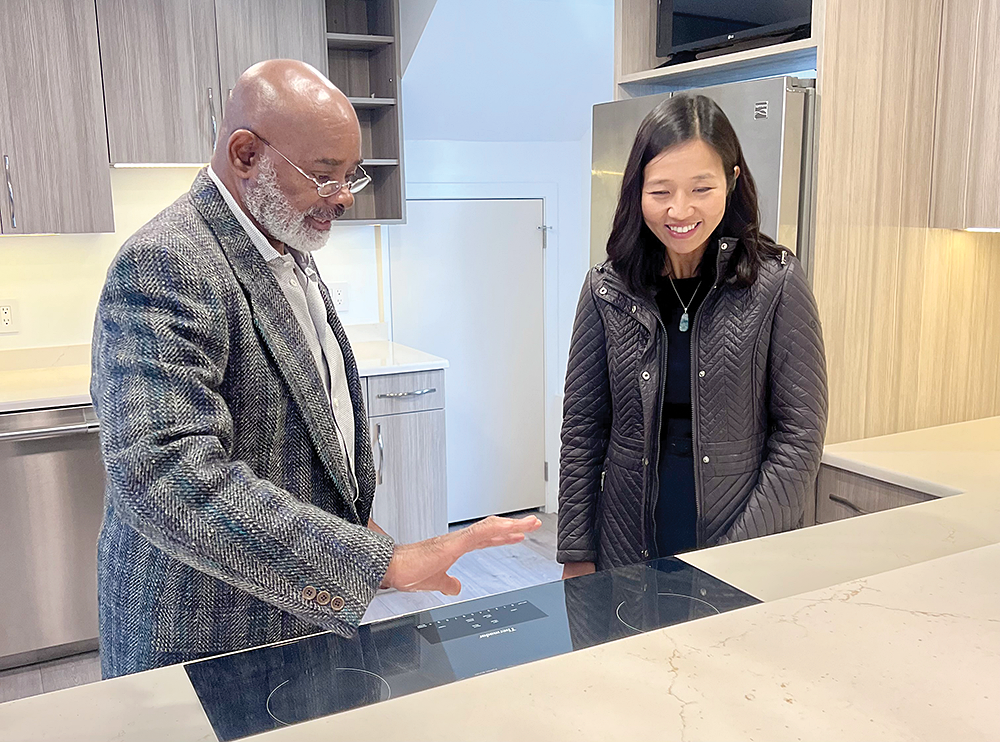October 25, 2023

Wu and city officials joined Kennedy and neighbors outside his Roxbury home last Wednesday. Cassidy McNeeley photos
From the curb, Mark Kennedy’s home on Centre Street in Roxbury looks like most others on his block: tidy, well-kept, and inviting. But the house, a single-family residence built in 1850, features a cellar that that he recently converted from its unfinished state into living space for his 89-year-old mother. The city refers to her new home as an additional dwelling unit, or “ADU.”
Last Wednesday, Mayor Wu and other officials toured the home while promoting the idea that ADUs like Mrs. Kennedy’s present another way to combat Boston’s housing shortage.
Mark Kennedy proudly showed off her full kitchen, bathroom, two bedrooms, and a laundry station, all completed by contractors from Allen’s Construction and Remodeling Inc.
Most notable to the mayor and group were the accessibility features inside and outside of the unit. Since his mother has mobility issues and uses a walker, it was important to Kennedy that she not have to face the same challenges when she moves into the space in the next month that she currently confronts in her three-story residence.
The features include a built-in handrail to take a small step up to the hallway that leads to a bathroom with an accessible bathtub and shower. A little farther down the hall are the two bedrooms, one of which includes one of the house’s five emergency exit options. And there are light switches that can be controlled through voice commands through Amazon’s Alexa.
“The main thing was to give her a unit without her having to enter by walking upstairs,” said Kennedy, who noted that the addition will also allow him to age in place and stay in his home.
According to Wu, there are now about 130 ADUs that have been created in Boston under the program, with 100 more on the way. The “new concept,” she said, allows homeowners to take previously unpermitted spaces and turn them into safe living environments.
Many of the completed ADUs are unrecognizable from what they once were, she noted. “It is gorgeous inside, absolutely beautiful,” she said about Kennedy’s new unit in the home he bought in 1996. “You walk inside you can’t even picture how it could be an unfinished basement.”
She added: “We want to make sure Boston is the best city for families, we want to make this available for all.”
While those who meet eligibility requirements can renovate a basement for family reasons, like Kennedy, others who are permitted can convert a pre-existing unit into a rental, carve out units by dividing floors into multiple studios or convert attics, or convert an attic.
New units in one, two and three-family dwellings must include a bathroom and kitchen, at least two ways to exit the building, accessibility to water and electricity shutoff valves, compliant ceiling heights, and an operating sprinkler.
To qualify for the ADU program, a homeowner must own the home and live in it. The unit also must be built within the footprint of the existing home, and above the Base Flood Evaluation if the home is in a FEMA flood zone.
“We want to make this available for all families to stay in place and have multigeneration support,” said Wu, who lives with her mother and describes it as a “stabilizing” and “loving” environment.

Homeowner Mark Kennedy showed Mayor Wu a newly-installed kitchen inside a new in-law apartment he created recently in his Roxbury home.
As Kennedy showed each feature to the mayor, his gratitude and enthusiasm were apparent to all. “I live on the other side of this ceiling with pleasure,” Kennedy said as he held his hand up in one of the bedrooms. “I’m excited and I know she is as well. Thank you to the city of Boston for their contribution.”
The Boston Home Center, part of the city’s housing department, also offers interest-free loans and gap funding up to $50,000 to eligible homeowners. Those interested in applying for the ADU program can visit boston.gov/departments/housing/addition-dwelling-units/adu-program.


